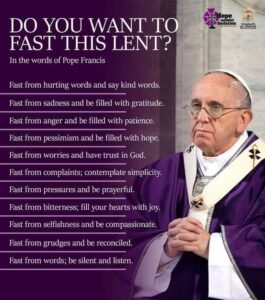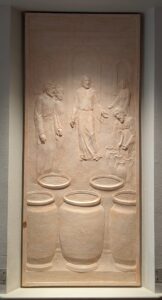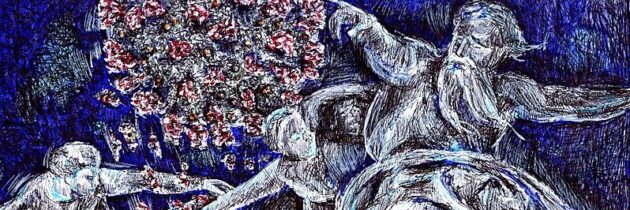A Clean Heart Create for Me
 The holy season of Lent begins on Ash Wednesday. This is a time of preparation and growth. In just six and a half weeks, we’ll arrive at Easter. In the northern hemisphere, Spring is fast upon us. Here on California’s Central Coast, it is in full swing. Trees and flowers are blooming. Birds are getting ready to fly north. Butterflies bring flashes of color to the landscape. Citrus trees are heavy with ripening fruit. And while we don’t have the cold, cold weather seen in so much of the world during Winter, the longer and somewhat warmer days are awakening itchy fingers, ready to plant the warmer season flowers and vegetables. It is a time for growth and renewal.
The holy season of Lent begins on Ash Wednesday. This is a time of preparation and growth. In just six and a half weeks, we’ll arrive at Easter. In the northern hemisphere, Spring is fast upon us. Here on California’s Central Coast, it is in full swing. Trees and flowers are blooming. Birds are getting ready to fly north. Butterflies bring flashes of color to the landscape. Citrus trees are heavy with ripening fruit. And while we don’t have the cold, cold weather seen in so much of the world during Winter, the longer and somewhat warmer days are awakening itchy fingers, ready to plant the warmer season flowers and vegetables. It is a time for growth and renewal.
The readings for this day speak of renewal, of God’s mercy, of recognition of our failings, and of ways to till the gardens of our hearts, making them fertile soil for receiving the gifts our Father has for each of us.
The prophet Joel (2:12-18) spoke at a time of swarms of locusts and a great drought that caused crop failure and famine in the land. This was seen as a time of loss of divine favor due to the sin of the people of Israel. But through Joel’s words, God calls the people back – to conversion through prayer and fasting. The reading concludes with the observation that the Lord took pity of his people, stirred to concern for his land.
Psalm 51 calls on God to be merciful, to wash away our offenses, cleanse us of our guilt, and put a new spirit within us. “A clean heart create for me, O God, and a steadfast spirit renew within me.” The joy of salvation and a willing spirit come as gifts from God. And we pray, “O Lord, open my lips, and my mouth shall proclaim your praise.” Praise and thanksgiving grow in the soil of a newly renewed heart.
St. Paul, in a second letter to the people of Corinth (2 Cor 5:20-6:2), begs them to be reconciled with God, for the sake of Christ. Christ gave himself so that humans could become the “righteousness of God.” But what is God’s righteousness? God is merciful and gracious. God is slow to anger, rich in kindness, relenting in punishment. These are characteristics of God, revealed by Joel in our first reading. This is the call of the followers, the sisters and brothers of Jesus. To be images of the God who loves and forgives. Again, something that can only grow from within the heart of each person. It doesn’t really come naturally to us.
Finally, Jesus gives us very specific instructions (Mt 6:1-6, 16-18). Summed up briefly: Don’t perform righteous deeds where people can see them! Be discreet in your life of faith. Give of what you have, but do it quietly, secretly. Pray quietly, by yourself. Wash your face, wear your regular clothes. Don’t do anything to draw attention and praise to yourself for your good deeds.
Why not be open and even brazen about doing these good deeds? Shouldn’t we be good examples to others? Because God is hidden and can only really be approached through the heart. God is love. God reaches quietly out to the heart of each and every person. It is only in the garden of the heart, just as it was in the Garden of Eden, that we meet and walk freely with our God. And when we are consistently meeting and walking with our God, there will be a certain something that is attractive about us, something that draws others to walk with God themselves.
“A clean heart create for me, O God, and a steadfast spirit renew within me.”
 Pope Francis has some suggestions for us this year. More challenging than giving up chocolate or TV or desserts, perhaps. Perhaps not. Certainly worth considering. What fertilizer does my inner garden need? What weeds need to be removed? What flowers and fruits will grow from my heart this year.
Pope Francis has some suggestions for us this year. More challenging than giving up chocolate or TV or desserts, perhaps. Perhaps not. Certainly worth considering. What fertilizer does my inner garden need? What weeds need to be removed? What flowers and fruits will grow from my heart this year.
Welcome to Lent – the season of growth and renewal as we prepare for the great mystery of redemption.
Read More
































